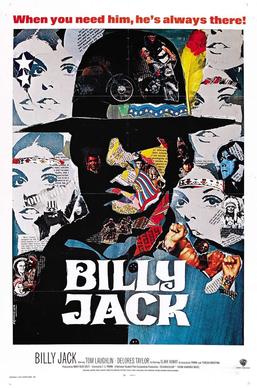Image from here
When I put Billy Jack in my Netflix queue, I expected to enjoy an hour and a half ridiculing everything about it. For the most part, that's what I got. The costumes, dialog and plot are cheesy, the acting is mostly horrific, even by the standards of the day, and the sound quality is so bad that entire scenes are indecipherable. Most of the characters are so flat they could easily be replaced with cardboard cutouts. What surprised me was that the heart of the film, the thing that made it such a big deal during my early teenage years, more or less survived the forty years since the film's release.
Billy Jack is a time capsule from the 1960's, told without Woodstock or Apollo. It is a sober reminder of the open hostilities that once existed within our culture, with racism fueling many of the individual conflicts. I was transported back to a time when I often felt physically at risk because of the length of my hair, and knew there were places I could not go with some of my friends. I can't help thinking that we may be closer to that sort of widespread violent confrontation today than we have been at almost any time since. Except most of us no longer have the physical courage to get involved.
Billy Jack, played by Tom Laughlin, is a half-breed karate expert war hero pacifist shaman trainee who protects wild mustangs and a school full of hippies on an Indian reservation. Laughlin also directed and co-wrote the movie. Laughlin's real-life wife Delores Taylor plays the director of the school, defending her misfit and cast-off students against the local townspeople. The local townspeople are portrayed as a surprisingly diverse group, with opinions ranging from sympathetic to openly stabby and rapey.
The theme of pacifism and non-violence that supposedly makes up one side of the argument seems ridiculously naive today, and the idea that anyone could even believe it could work gave me a little twinge of nostalgia for the innocence of youth. Much of the critical pasting the film got in its time was because it's theme of non-violence was embedded in what was essentially a kung fu movie, before there were kung fu movies. All the lines I remember people reciting were about kicking dudes in the head, and trying (unsuccessfully) not to go berserk.
There were some bright spots. Taylor was nominated for a Golden Globe for her performance, and legend has it that Marlon Brando stood up and stopped a pre-release screening to tell the audience that her performance in one scene had set the bar for emotional realism and depth. It's hard to believe today, but watch a few movies from the time and it gets easier. And even as I laughed at the hair and the clothes and the characters, I found myself caring just a little about what happened to them, which I really didn't expect.
Oh, and Howard Hesseman has a mid-sized role in the film. So that was fun. It only took about five minutes of "who is that guy?" before I figured out it was my old friend Johnny Fever from WKRP.
Even if you don't see the movie, I think you owe it to yourself to check out the official Billy Jack website. I was afraid to click on anything, but it's definitely entertaining. Do it, or I'm going to take this right foot and put it upside your head, and there is not a thing you will be able to do about it.

time traveling with you this morning... watched the trailer for "Billy Jack Goes to Washington" and felt myself trasnported to my 10-year old self. i ate that stuff up... despite the quirky acting, bad scripts and horrific production quality...
ReplyDeleteGood to see Tom Laughlin is still out there, working for some sort of justice for something or other...